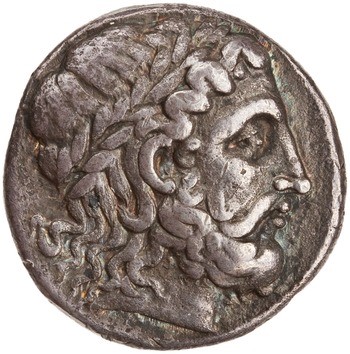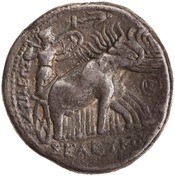Doctoral dissertation project of Lorenzo Paoletti
Resistance and opposition to the Macedonian kingship in the ancient Iranian world (working title)
This doctoral dissertation focuses on criticism and opposition to Greek-Macedonian ruling élites in non-Greek authors and sources of the Hellenistic era. This topic was first widely discussed by Samuel Eddy in 1961 (The King is Dead). Starting from Eddy’s perspective, this research will draw new attention to the phenomena of resistance to Greek-Macedonian dynasties throughout the Hellenistic World.
Since the end of the 1980s, scholars began to focus on interactions and connections between Greek-Macedonian conquerors and local population and traditions. In the last decades many studies were conducted about the concepts of ethnicity, connectivity, mutual cultural influence between Hellenic and Oriental traditions in a cross-cultural perspective. However, this project intends to give attention and light to those hints and documentation that provide us with a different portrait of such co-existence. The research starts from the account of Classical sources about the relationship of the Macedonians with Iranians and then analyzes it from the perspective conveyed by the Iranian sources. Attention will be given to other typologies criticisms to Graeco-Macedonian monarchies, such as deconstruction of symbols and delegitimization of standing powers.
Therefore, in order to understand that very entangled reality, an interdisciplinary approach using different kinds of sources (literary, numismatic, epigraphic) and disciplines is needed. One of the key purposes of the dissertation is to determine if such processes of delegitimization of ruling powers had common features all over the Hellenistic World and shared similar causes. The geographical focus is broad and stretches from Syria through Mesopotamia until India where Iranian communities settled since the Achaemenid era. Apocalyptical and prophetical literature retain a central importance in this project because it reflected hopes and beliefs in a future justice and restoration of a political order destroyed by the instauration of a new rule. Furthermore, the comparison with the more profoundly analyzed contexts of Judea and Egypt will provide the research with examples of opposition to the Greek-Macedonian establishment. Eventually, this study aims to surpass the dualistic view of Greeks and the “others” that still affects Ancient Greek history studies, to understand if Hellenism was perceived by local élites as a global phenomenon and power structure or was only interpreted as a foreign conquest.
Short biography
Lorenzo Paoletti completed his BA in History at the University of Bologna in 2016 with a thesis on the interactions between Antiochos III and the Roman Republic. After spending a year at the University of Cologne as an Erasmus student, he wrote his MA thesis (Bologna 2018) about institutional and social history of the late Seleukid kingdom (2nd–1st centuries BCE). In April 2019, he was awarded a doctoral fellowship at the a.r.t.e.s. Graduate School of Cologne within the EU co-funded programme a.r.t.e.s. EUmanities. His doctoral dissertation project investigates criticism of and opposition to the Graeco-Macedonian ruling élites in non-Greek authors and sources of the Hellenistic era. His dissertation is supervised by Prof. P.F. Mittag (University of Cologne), Prof. F. Muccioli (University of Bologna) and Prof. A. Erskine (University of Edinburgh). His main research interests are in Ancient Greek and Roman history, with a focus on Hellenistic history and the relationships between East Mediterranean and Near East local communities in the Seleucid kingdom. Beyond the Hellenistic World, his research interests also include Greek Classical age with a special focus on Greek epigraphy and institutional history.
Contact: lorenzo.paoletti(at)studio.unibo.it
Publications
Articles:
L. Paoletti (2022),‘Antigono Monoftalmo e la vite d’oro: la simbologia della regalità achemenide alla luce dei rapporti tra Greci, Macedoni e Iranici’, Ricerche Ellenistiche 3, forthcoming.
L. Paoletti (2022), ‘Cretans Soldiers at the Seleucid Court and the Enigmatic Case of Lasthenes: from μισθοφόρος to ἐπὶ τῶν πραγμάτων?’, Dialogues d’Histoire Ancienne, forthcoming
L. Paoletti (2020), ‘Antioco IV, Delo e un’eco della Sesta guerra di Siria in IG XI 4, 1215. Il caso di Demetrio: principe o sacerdote?’, Zeitschrift für Papyrologie und Epigraphik 213: 149–157.
Reviews:
L. Paoletti (2022), ‘Fred S. Naiden, Soldier, Priest, and God. A Life of Alexander the Great, Oxford - New York, Oxford University Press 2019, pp. 407.’ Athenaeum 110/1, forthcoming
L. Paoletti (2019), ‘Paul J. Kosmin, “Time and Its Adversaries in the Seleucid Empire’, Cambridge-London, Harvard University Press, 2018, pp. 392.’, Storicamente 15, 1-3.
Reports:
L. Paoletti (2018), ‘Spätantike Quellen für das Studium der senatus consulta: Wege zwischen Jurisprudenz und Historiographie’ in Quaderni Lupiensi di Storia e Diritto 8, 2018, 598-601. Westfälische Wilhelms-Universität Münster 04-05 April 2018 Coordinators: Prof. Pierangelo Buongiorno - Prof. Sebastian Lohsse.
Conferences
Lausanne 21st October 2022. Partecipation as speaker: INTER-CULT: Cultic honours and divinisation in the Hellenistic Eastern Mediterranean – New voices for interdisciplinary collaboration. Coordinators: Prof. Giuseppina Lenzo – Prof. Stefano Giovanni Caneva
Bologna 18th-20th November 2021. Partecipation as organizer: International conference: ‘Le emozioni nelle poleis. Dinamiche storiche interpretazioni storiografiche, riflessioni politiche e culturali in Grecia ‘propria’ e nell’Oriente greco'
Sopot /Gdańsk, 29th July – 2nd August 2019. Participation as speaker: International conference: Seleucid Study Days 7 ‘Warfare, Military & Society in the Seleukid Kingdom’, Paper: “Cretans soldiers at the Seleukid court and the enigmatic case of Lastenes: from μισθοφόρος to ἐπὶ τῶν πραγμάτων” Coordinators: Prof.Altay Coskun, Prof. Nick Sekunda, Dr. Dawid Borowka
28th-30th June 2017, Aberystwyth (Wales). Participation as speaker: International Ancient Warfare Conference 2017 National Library of Wales, Paper: “Macedonian cavalry in the Seleucid Empire: developments and new structures at the end of the third century BC” Coordinators: Geoff Lee (National Library of Wales)
Seminars and Workshops
Doctoral Seminar: ‘Alma Mater Abroad’ 15th April 2021. Partecipation as speaker: A seminar aimed to help graduate students in finding PhD positions and funding in different and international academic environments with speakers from European, American and Canadian Universities.
Doctoral Seminar: ‘Habent sua fata libelli. Dialoghi tra giovani antichisti’ Bologna 23th June 2021 Partecipation as organizer and speaker: A seminar on the organization of the Doctoral of research and the future perspectives for Early stage researchers in an international environment with speakers from different European and Canadian Universities.
Digital Humanities Workshop: ‘Bologna EpiDoc Workshop 2019’ Bologna 27th-31st May 2019. Partecipant. Workshop on the EpiDoc markup language for the digitalization of ancient epigraphic and papyrological texts. Coordinator Prof. Alice Bencivenni
Cover photo: Silver tetradrachm of Seleucus I Nicator minted in Susa (295-281 BC). Obverse: laureate head of Zeus right. Reverse: BAΣΙΛΕΩΣ ΣΕΛΕΥΚΟΥ: Athena in elephant quadriga right, brandishing spear and shield. American Numismatic Society n.1944.100.73361 // Portrait photo: Patric Fouad
a.r.t.e.s. EUmanities has received funding from the European Union's Horizon 2020 research and innovation programme under the Marie Skłodowska-Curie grant agreement No 713600.
Details:
Call: H2020-MSCA-COFUND-2015 | Proposal: 713600 – artes EUmanities
CORDIS: http://cordis.europa.eu/project/rcn/203182_de.html


